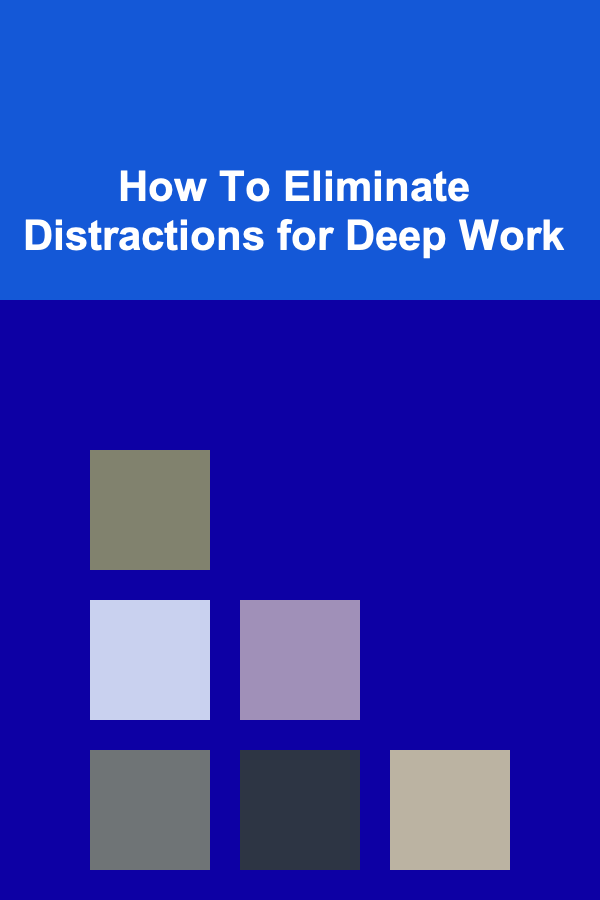
How To Eliminate Distractions for Deep Work
ebook include PDF & Audio bundle (Micro Guide)
$12.99$11.99
Limited Time Offer! Order within the next:

In a world full of interruptions, distractions, and constant notifications, achieving deep work---those long, uninterrupted periods of focused, high-concentration work---can feel nearly impossible. Yet, deep work is not only essential for achieving excellence in any field, but it is also necessary for personal growth and productivity. In this article, we will explore strategies for eliminating distractions and creating the ideal environment for deep work.
Understanding Deep Work
To begin, it's important to understand what deep work actually is. The term was popularized by Cal Newport in his book Deep Work: Rules for Focused Success in a Distracted World. According to Newport, deep work refers to the professional activities performed in a state of distraction-free concentration that push cognitive capabilities to their limits. It requires focused attention, complex problem-solving, and the development of new skills or products. In contrast, shallow work refers to tasks that are easy, often administrative, and can be completed with less cognitive effort.
Deep work is incredibly valuable, as it allows individuals to accomplish more in less time, improve the quality of their work, and experience the satisfaction of mastering complex subjects or skills. However, achieving deep work is not easy in a world filled with distractions.
The Nature of Distractions
Before diving into how to eliminate distractions, we need to understand what distractions are and how they affect our ability to concentrate. Distractions can be both external and internal.
External Distractions
External distractions are those that come from outside ourselves. They can be environmental (such as noise, people, or technology) or social (like unexpected phone calls, social media notifications, or casual conversations). These interruptions pull us away from the task at hand and disrupt our focus, making it difficult to achieve sustained periods of deep work.
Internal Distractions
Internal distractions, on the other hand, are those that stem from our own thoughts, emotions, or mental states. For example, worries, anxiety, or stress about personal issues can prevent us from focusing on the task at hand. Likewise, our desire for instant gratification, such as the urge to check social media or respond to a text message, can break our concentration and pull us away from deep work.
Both external and internal distractions can make it difficult to focus on high-level, complex tasks that require sustained mental effort. So, how do we overcome these distractions?
Strategies for Eliminating External Distractions
The first step in eliminating distractions for deep work is addressing the external factors that create interruptions. By controlling your physical environment and technological devices, you can set yourself up for success.
1. Designate a Quiet, Distraction-Free Workspace
One of the most effective ways to eliminate distractions is by creating a dedicated workspace where you can focus exclusively on deep work. This could be a home office, a quiet corner in a library, or any place where you can separate yourself from distractions.
In your workspace:
- Minimize Noise: If you are in a noisy environment, consider using noise-canceling headphones or playing ambient sounds that help you focus.
- Declutter Your Desk: Keep only the essentials on your desk---things that help you work and avoid unnecessary items that could become distractions.
- Control the Lighting: Lighting can have a significant impact on focus and productivity. Make sure your workspace is well-lit but not overly bright, as this can cause discomfort. Adjust the lighting to suit your needs.
2. Turn Off Notifications
Modern technology is a major source of distraction. Smartphones, computers, and social media apps constantly alert us to new messages, emails, and notifications. These interruptions can significantly disrupt your flow state and prevent you from achieving deep work.
To combat this:
- Turn off non-essential notifications: Go into your phone's settings and disable notifications from apps that aren't important during work periods.
- Use focus modes: Many devices have "Do Not Disturb" or "Focus" modes that you can activate to prevent distractions during deep work periods. Use these features to minimize interruptions.
- Limit your use of social media: Social media platforms are designed to keep you hooked and engaged, so it's important to limit their use when you need to focus. Consider using apps like Freedom or Cold Turkey to block distracting websites during work hours.
3. Set Boundaries with Others
If you work in a shared space or live with other people, it's important to establish boundaries and communicate your need for deep work. Make sure those around you understand the importance of uninterrupted time and the impact of distractions on your work.
- Create a clear signal: Whether it's closing the door to your office, wearing noise-canceling headphones, or setting a timer, create a visual or auditory cue that signals to others when you're in deep work mode.
- Establish "office hours": If you're working from home or in a shared space, set specific hours during which you are unavailable for socializing or other non-work-related activities.
- Let others know your schedule: If you have family members or roommates, inform them of the times when you will be focusing deeply, so they can avoid interrupting you.
4. Control Your Environment
Beyond your immediate workspace, controlling the environment around you can also help minimize distractions.
- Adjust your technology: Use tools like website blockers, productivity apps, and task managers to limit distractions and help you stay on track.
- Optimize your work hours: Consider working during times when your environment is naturally quieter, such as early in the morning or late at night.
Strategies for Overcoming Internal Distractions
While external distractions can be managed with the right tools and techniques, internal distractions require a different approach. Internal distractions, such as stress, worry, and mental fatigue, can undermine your ability to focus. Here's how to address them:
1. Practice Mindfulness and Meditation
One of the most effective ways to reduce internal distractions is through mindfulness and meditation. These practices help you become more aware of your thoughts and emotions, allowing you to separate them from the task at hand.
- Mindfulness: Practicing mindfulness involves focusing on the present moment and acknowledging your thoughts without judgment. It helps you stay aware of when your mind starts to wander, so you can gently bring your focus back to the task.
- Meditation: A regular meditation practice can help calm your mind, reduce anxiety, and increase your ability to concentrate. Even just 10 minutes a day can have a significant impact on your focus and productivity.
2. Address Mental Fatigue
Mental fatigue is one of the most significant barriers to deep work. If you're tired, your brain will struggle to stay focused and engaged in the task. To combat mental fatigue, consider the following:
- Take regular breaks: Follow the Pomodoro Technique or a similar approach that involves working for 25-50 minutes, followed by a 5-10 minute break. This helps maintain your energy and focus throughout the day.
- Get adequate sleep: Sleep is essential for cognitive function. Ensure you're getting enough rest to stay mentally sharp during deep work sessions.
- Exercise regularly: Physical activity helps reduce stress, increase energy, and improve overall cognitive performance.
3. Set Clear Goals and Priorities
When your mind is cluttered with too many tasks or goals, it can be difficult to focus on any one thing. One way to overcome this is by setting clear goals and priorities for each deep work session.
- Break down tasks into manageable chunks: Large projects can feel overwhelming. Break them down into smaller, more manageable tasks to make them less intimidating.
- Set specific goals for each session: Before starting a deep work session, decide exactly what you want to accomplish. This could be writing 1,000 words, completing a coding task, or solving a specific problem.
- Track your progress: Keep track of your accomplishments throughout the day. This can provide motivation and help you stay focused on your goals.
4. Cultivate Discipline and Willpower
Deep work requires a significant amount of self-discipline. You must train yourself to stay focused despite the temptation to check your phone or get sidetracked by other tasks. Cultivating discipline takes time and effort, but the rewards are well worth it.
- Practice self-control: Start by committing to short periods of focused work and gradually increase the length of time as your discipline improves.
- Create rituals: Establishing rituals around your work routine can signal to your brain that it's time to focus. For example, you could make a cup of tea before each deep work session or listen to a particular playlist that helps you concentrate.
Conclusion
Achieving deep work in today's distracted world is undoubtedly challenging, but it is not impossible. By managing your environment, minimizing external distractions, and addressing internal obstacles like mental fatigue and stress, you can create the conditions necessary for sustained focus and productivity. It's also essential to practice mindfulness, set clear goals, and develop the discipline to stay focused on the task at hand.
Ultimately, deep work is a skill that requires practice and dedication. The more you embrace strategies to eliminate distractions, the more you will find yourself able to achieve exceptional levels of productivity, creativity, and personal growth. So, take the time to design your work environment, eliminate distractions, and commit to the process of deep work. Your future self will thank you for it.
Reading More From Our Other Websites
- [Weaving Tip 101] Beyond the Basics: Advanced Techniques to Keep Your Weaving Hobby Fresh and Exciting
- [Organization Tip 101] What Are the Best Practices for Organizing Shoes?
- [Home Staging 101] How to Stage a Home with Open Floor Plans to Maximize Flow
- [Organization Tip 101] DIY Crown Molding: Tools You Need for a Professional Finish
- [Home Maintenance 101] How to Keep Your Home's Electrical System Safe and Up to Code
- [Home Cleaning 101] How to Clean Ceiling Fans: Tips for Dusting and Maintaining Your Home's Airflow
- [Home Budget 101] How to Save Money on Utilities: Energy-Saving Tips to Lower Your Bills
- [Ziplining Tip 101] Step-by-Step Guide to a Fear-Free Zipline Experience for Height-Phobics
- [Personal Care Tips 101] How to Switch Your Aftershave for Different Occasions or Moods
- [Screen Printing Tip 101] Spotlight on Artists: Iconic Creators Who Define the Screen Printing Scene

How to Choose the Right Holiday Colors for Your Home Decor
Read More
How to Create a Checklist for Email Campaign Automation
Read More
How to Create a Comfortable and Functional Living Space
Read More
How to Keep Your Linen Closet Organized and Easily Accessible
Read More
How to Work Part-Time as an Online Sales Consultant from Home
Read More10 Ways to Use a Home Insurance Expense Tracker for Tax Deductions
Read MoreOther Products

How to Choose the Right Holiday Colors for Your Home Decor
Read More
How to Create a Checklist for Email Campaign Automation
Read More
How to Create a Comfortable and Functional Living Space
Read More
How to Keep Your Linen Closet Organized and Easily Accessible
Read More